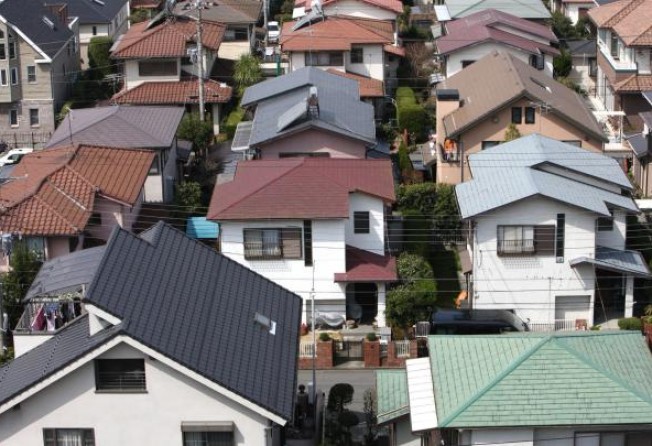Japan enjoys home sales rush to beat looming tax rise
New housing loans up 14.7pc as buyers take the plunge before increase in sales levy in 2014 adds cost of a Toyota Corolla to the average property

Record low mortgage rates and the prospect of a consumption tax jump that will add the price of a new Toyota Corolla to the cost of an average home spurred Sumiko Morigaki into action.
"Tax hikes have been looming, so that gave me a push to buy," Morigaki, 43, a manager at an apparel retailer in Tokyo, said after buying a three-bedroom flat in Kanagawa prefecture, near Tokyo.
New housing loans jumped 14.7 per cent in the second quarter this year from a year ago, the most since March 2006, lifting a housing market entering its third decade of deflation.
About 1.3 trillion yen (HK$128 billion) of extra home purchases are expected by the end of March 2014, in the year when the sales tax will increase to 8 per cent from 5 per cent, according to estimates by NLI Research Institute, a Tokyo-based research unit of Nippon Life Insurance.
"The housing market has been dead for so long it shouldn't take much to put a flame under it," Nicholas Smith, a strategist at CLSA Asia-Pacific Markets in Tokyo, said. "Banks, particularly regional banks, stand to benefit from the rush of home loans ahead of the tax hike."
Housing investments rose 3.8 per cent to 13.1 trillion yen in the year to March 31, marking the first increase in five years, according to government data. Japan's banks offered 2.98 trillion yen worth of new loans for home purchases in the three months to June 30, bringing loans outstanding to 107.1 trillion yen, according to the Bank of Japan.
An index of residential land prices has slid by half from its 1991 peak, Japan Real Estate Institute data shows.
Commercial banks accounted for the biggest share of new loans by lender type, making up 66 per cent in the first three quarters of the year that started last April, followed by Japan Housing Finance Agency which constituted 15 per cent, according to a July 23 report from Standard & Poor's.
In August Prime Minister Yoshihiko Noda won parliamentary approval for his bill to double the country's sales tax of 5 per cent to ease the government's reliance on debt.
Property and fund association groups are asking for taxes on home purchases to be cut to counter an expected slowdown after the increase in the levy. The bill raises the tax to 8 per cent in April 2014 and to 10 per cent in 2015.
Ahead of the most recent increase to the tax to the current 5 per cent, from 3 per cent in 1997, housing investments surged to almost 28 trillion yen in April 1996, according to NLI Research. Last-minute buying of houses ahead of that tax increase was about 2.4 trillion yen.
The peak for such last-minute buying demand this time around may come in the fourth quarter of next year, Taro Saito, director of economic research at NLI said. Developers and construction companies probably would benefit most from the increase in demand, he said.
Japan's regional banks, which rely on home loans for a larger slice of profits compared with the biggest banks, may get the biggest boost from a lending binge, Shinichi Ina, a Tokyo-based bank analyst at UBS, said.
"Expectations are rising that mortgage lending will increase ahead of the tax increase," Ina said. "Regional banks that have been centring their businesses on housing loans may see more benefits."
Regional banks stood to outperform, Smith said in a report dated June 25. The biggest banks underperformed from April 1996 to April 1998, when the consumption tax was raised last time, he said. Buildings are subject to the tax, while land is not. For a flat costing 46 million yen, the average for new apartments in the Tokyo area, the levy will rise to 2.3 million yen, from 1.15 million yen, in three years, supposing that half the apartment price, excluding the land value, is subject to the sales tax. The price of a new Toyota Corolla starts about 1.38 million yen in Japan.
The Bank of Japan's policy to maintain rates near zero as it struggles to spur the economy has already benefited homeowners. Japan's benchmark 10-year yield fell to a nine-year low of 0.72 per cent on July 23, and remains the third-lowest globally after yields in Switzerland and Hong Kong. The rate was at 0.81 per cent on August 24.
Tracking the bond yield, mortgage rates have declined to record lows. The 30-year fixed-rate mortgage offered by Mitsubishi UFJ Financial Group was at 2.4 per cent this month, according to the bank. That compares with the average 30-year fixed-rate mortgage of 3.66 per cent in the United States, according to a Freddie Mac index.
The index measuring the number of potential home buyers visiting apartment showrooms increased to 51.7 points as of April 1 from minus 21.2 on January 1, suggesting increased appetite for purchases, according to a survey based on 32 property companies by the Land Institute of Japan.
"Given the hike this time is 5 percentage points not 2 percentage points, the pre-buying is likely to be substantially larger," Smith said.